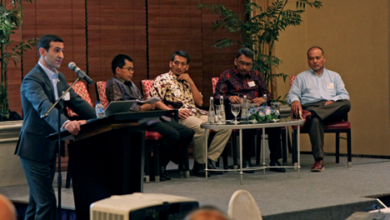Wirelines
IADC Comments on President Obama’s 2017 Budget, Urges Collaboration with Industry to boost American Economy
On 9 February, the US White House released President Barack Obama’s 2017 budget proposal. In response, IADC President Jason McFarland issued the following statement:
“The US oil and natural gas industry supports 9.8 million jobs and contributes billions of dollars each year to the US Treasury. Despite these significant contributions, the president’s budget continues to use the oil and natural gas industry as an ATM to pay for proposals to fix traffic congestion, poor infrastructure and other items that our nation needs to address. This needs to be done without penalizing an industry that spurs our economic development and provides much needed energy for the US.
“IADC members are eager to work with this administration to reduce the overzealous regulations that impede our ability to work. We can, and do, provide good-paying middle-class jobs, which is an acknowledged priority for this administration. However, we are only able to accomplish this if we are allowed to operate in an economically feasible and predictable regulatory environment.”
United States Coast Guard Issues Cybersecurity bulletins
The United States Coast Guard recently issued two bulletins, both regarding cybersecurity, which are of interest to the drilling industry.
Maritime Cyber Bulletin 003-16 raises awareness of recent malicious cyber activity in the maritime domain and provides further information about the events. It provides an overview of current Joomla vulnerabilities being targeted by malicious cyber actors and provides prevention and mitigation information.
Maritime Cyber Bulletin 004-16 highlights vulnerabilities in certain models of shipboard voyage data recorders. It provides an overview of the vulnerabilities and provides mitigation and remediation information.
Click here to access Maritime Cyber Bulletin 003-16.
Click here to access Maritime Cyber Bulletin 004-16.
United States Federal Courts deny Department of Interior Requests to Expedite Hydraulic Fracturing Rule Case
In March of 2015, the US Bureau of Land Management (BLM) issued a hydraulic fracturing rule that aims to regulate oil and gas production activity on public and tribal lands. IADC, along with other industry groups, have questioned the necessity of the rule, arguing that it will only increase costs and regulatory redundancy, ultimately impacting America’s long-term energy security.
The rule includes requirements that replicate controls already in place. The existing requirements are based on the good oilfield standards that industry has routinely practiced for many years and on which it continuously improves.
The BLM estimates that the rule will impose additional annual costs of $32 million, with other entities estimating a much higher expense.
In early January 2016, a federal court in Wyoming rejected attempts by government lawyers to speed up litigation on the BLM ruling. Currently, the case focuses on whether the Department of the Interior, which oversees the BLM, had the authority to make the ruling and whether the rulemaking was improper.
As the case makes its way through the court system, current regulations will apply as industry awaits a resolution.
West Virginia engaged in updates to oil and gas regulation and legislation
West Virginia Oil and Natural Gas Industry Safety Commission issues report
West Virginia Gov. Earl Ray Tomblin initiated the Oil and Natural Gas Safety Commission in July 2015 to determine how to best protect workers at natural gas operations and ensure they have proper training and skills to do their jobs safely and effectively.
IADC was invited to present before the commission in September 2015 and cited the association’s history of developing industry training and accreditation programs.
In January, the commission published a report detailing key findings and recommendations. Those involved concluded that although existing regulations and best practices are helping to improve overall safety, more can and should be done, including additional safety practices and training. The commissioners agreed that education, training and prevention are the best approaches to ensuring a safe workplace.
Based on the findings of the report, the commission made 18 recommendations to the governor.
West Virginia Legislature contemplates changes to Horizontal Well Development Rule
The West Virginia legislature, in session through 12 March, is considering updates to the horizontal well rule. The amendments propose creating new regulations that would require the promulgation of legislative rules related to drilling activities in karst regions; drinking water well flow and quality testing; and horizontal well plugging procedures.
Additional revisions establish or modify existing rules in the following areas: prevention of well communication through unintended fracture propagation; well pad and centralized waste pit construction standards; groundwater aquifer analysis for water supply well; annual and other reporting requirements and waste storage and drilling procedures.
Click here to view the West Virginia Safety Commission Report.




